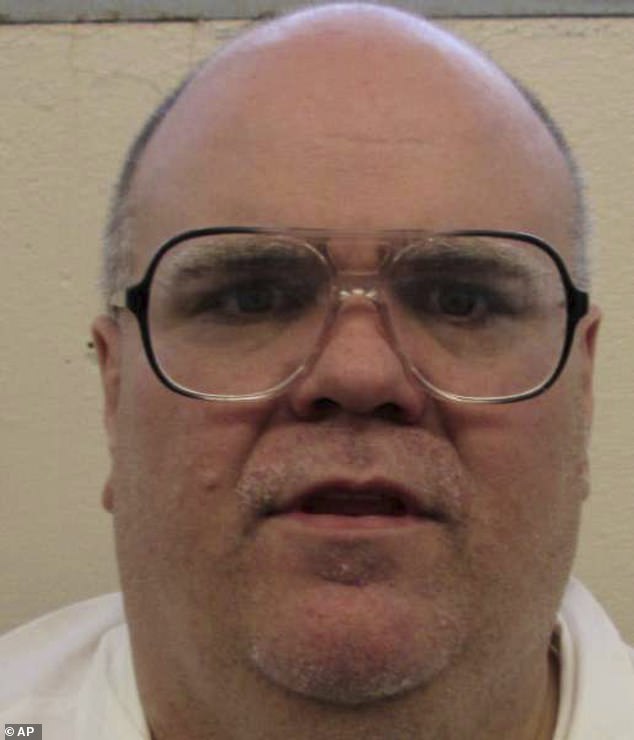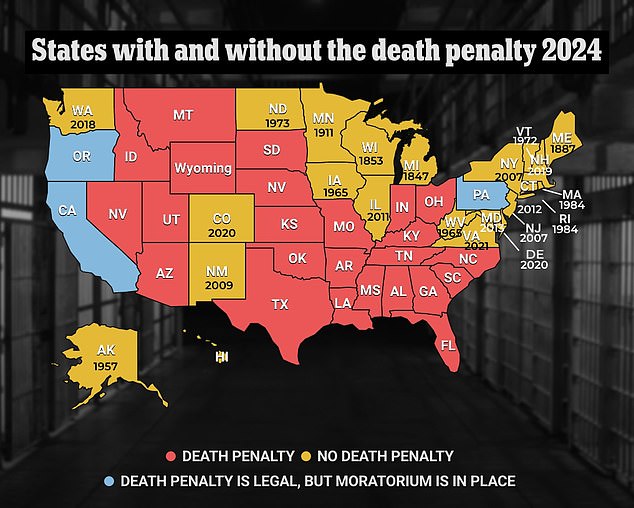An Alabama inmate has filed a lawsuit against the state to avoid becoming the second person executed with nitrogen gas, alleging “cruel and unusual punishment.”
Alan Eugene Miller, 57, survived an attempted execution by lethal injection in 2022 and will now be the second to die from nitrogen gas.
His execution date is set for Sept. 22 at the William C. Holman Correctional Facility in Escambia County, but his attorneys are fighting using the method after a killer subjected to nitrogen gas writhed in agony for 22 minutes on January 25.
Kenneth Smith was left shaking and convulsing on a stretcher as he was executed, prompting Miller’s legal team to claim that using nitrogen gas killing on their client would be “cruel and unusual punishment.”
Attorneys have also claimed that the state is trying to “silence” Miller, who spoke out against lethal injection after the failed attempt, which they have called a violation of his free speech and due process rights.

Alan Eugene Miller, 57, survived an attempted execution by lethal injection in 2022 and will now be the second to die from nitrogen gas.


Kenneth Eugene Smith was sentenced to death in 1996 after admitting to the contract murder of a pastor’s wife who was beaten and stabbed in 1988. On January 25, he became the first person in U.S. history to be executed with nitrogen gas. .


Miller is currently being held at the Holman Correctional Facility in Escambia County, Alabama.
“Instead of addressing these failures, the state of Alabama has attempted to maintain secrecy and avoid public scrutiny, in part by misrepresenting what occurred in this botched execution,” the attorneys wrote.
They said Alabama could not carry out such an execution “without cruelly adding pain and shame and prolonging death.”
A spokeswoman for Alabama Attorney General Steve Marshall did not immediately respond to a text message seeking comment on the lawsuit.
Despite Smith’s clearly agonizing and torturous death, Alabama Attorney General Steve Marshall vowed to continue using nitrogen gas to execute prisoners.
Marshall filed a motion in February asking the court to allow the Alabama Department of Corrections to execute Alan Eugene Miller, who has been on death row since 2000 for murdering two co-workers and a former co-worker at separate locations in 1999.
Alabama has also offered to help other states attempting to carry out executions using nitrogen gas, a method that Alabama called “the most painless and humane method of execution known to man” but which human rights groups have condemned as cruel. and tortuous.


Alabama Attorney General Steve Marshall (pictured) vowed to continue using nitrogen hypoxia for executions in the state, noting that 43 prisoners on death row in Alabama have chosen to be executed using nitrogen hypoxia instead lethal injection.
What happened last night was textbook,” Marshall said after Smith’s execution, contrasting accusations from many, including Smith’s spiritual advisor, who said it was “torture” and “the worst thing” he had ever seen. life.
“When they turned on the nitrogen, he started convulsing, jumping on the gurney over and over, shaking the whole gurney,” said spiritual advisor Jeff Hood, who was in the chamber, immediately after the execution.
Marshall said that of the 165 inmates on death row in Alabama, 43 inmates have opted to be executed by nitrogen hypoxia rather than lethal injection when their time comes.
“We will definitely have more nitrogen hypoxia executions in Alabama,” he concluded.
In documents filed before the execution, the state argued that “experts agree that nitrogen hypoxia is painless because it causes unconsciousness within seconds.”




Marshall reportedly admitted that this was not exactly how it played out Thursday night, as it took longer than anticipated, but said it was difficult to discern the timing due to the difficulty in knowing when the nitrogen started flowing.
“It’s interesting to see the attorney general say that everything went according to the plans he laid out,” Hedgepeth said. MSNBC.
‘We saw him begin to shake violently, hitting the straps that held him.
“This was the fifth execution I have witnessed in Alabama, and I have never seen such a violent execution or such a violent reaction to the means of execution.”
